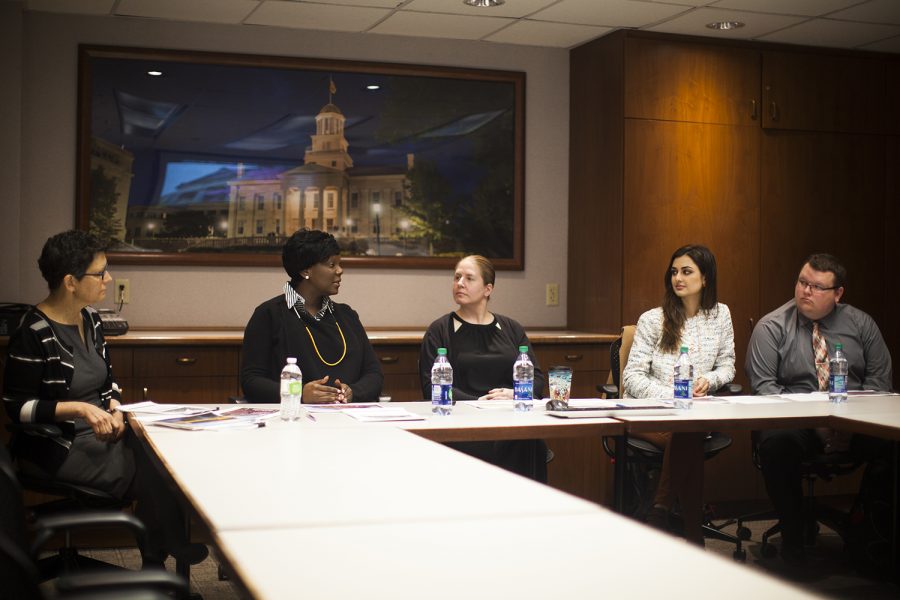Data show marginalized UI community members report lower satisfaction with campus climate
UI community members report varying degrees of satisfaction with campus climate depending on their identities and background, data show.
The University of Iowa Office of Strategic Communication meets in the Iowa Memorial Union on Thursday, April 4th, 2019. The group meets to discuss the Campus Climate Survey results and to unveil their new Diversity, Equity, and Inclusion Action Plan.
April 7, 2019
While members of the University of Iowa community report being satisfied overall with the campus climate, recently released UI data show community members who identify as part of a marginalized population report lower satisfaction with the campus environment.
The UI collected data via email and through listening sessions from faculty and staff, undergraduates, and graduate and professional students in spring of 2018 for its first-ever set of campus-climate surveys to gauge how people of different identities and backgrounds experience the UI.
Faculty responded at the rate of 33 percent, while staff responded at a rate of 21 percent. Nineteen percent of undergrads and 35 percent of graduate and professional students responded to the survey.
UI sociology Assistant Professor Sarah Bruch, the director of the Social and Education Policy Research Program at the Public Policy Center and the co-chair of the UI Charter Committee on Diversity, said most campus-climate surveys nationwide receive a response rate in the 20 percent range, suggesting the UI’s survey offered a representative assessment of the campus climate.
“In terms of representativeness, we did an analysis to look at the demographic characteristics of those people who took the survey compared to the population,” Bruch said. “And for the most part, all survey samples are representative of our population.”
Despite the overall satisfaction with the campus climate, around 40 percent of faculty and staff said they have seriously considered leaving the UI in the last 12 months.
“That’s a number that really gets our attention, when thinking about retention,” Bruch said.
RELATED: UI unveils Diversity, Equity, and Inclusion action plan
Departmental climate is one of the most prevalent reasons people consider leaving, she noted. Among those who responded they have considered leaving, 60 percent of staff and 47 percent of faculty named departmental climate as a reason. Pay was another factor that a majority of faculty and staff identified.
Separate from the finding that some faculty have considered leaving, discrimination was reported among nearly 50 percent of faculty and staff respondents.
• Age was the most common type of discriminatory experience for faculty (24 percent) and staff (27 percent)
• For faculty, gender identity or gender expression was the second most common type (23 percent)
• For staff, political ideology was the second most common type (18 percent)
According to the findings, undergrads, as well as graduate and professional students, reported the most common type of discrimination they face was for their political orientation at 35 percent and 18 percent, respectively. This was followed by gender identity or gender expression at 22 percent for undergrads and 17 percent for graduate and professional students, and racial/ethnic identity at 17 percent and 14 percent.
In listening sessions, undergrads discussed the importance of feeling as if they belong and are valued on campus, the findings showed.
“They discussed how much they value the cultural houses, resources centers, and [residence hall living-learning communities] for their inclusive and welcoming atmosphere, but how these resources are not well-supported through funding, staffing, or messaging,” the report said.
Meanwhile, graduate and professional students discussed in listening sessions how a lack of diversity among faculty and staff causes an issue for recruitment and retention, negatively affecting student engagement and support.
Those students also said they would like to see more events, programming, and coursework that promote and boost understanding of diversity, equity, and inclusion.
These findings, outlined in diversity, equity, and inclusion reports based on the survey data for each of the campus groups — faculty and staff, undergrads, and graduate and professional students — culminated in the UI’s creation of the 2019-21 Diversity, Equity, and Inclusion Action Plan.
Assistant Provost for Faculty Diane Finnerty said the UI will use climate-survey data as a baseline to assess whether the university has moved the needle on practices that strengthen feelings of inclusion.
“These are a new way of looking at … how do the people who live, work, and study here experience our campus,” she said.






